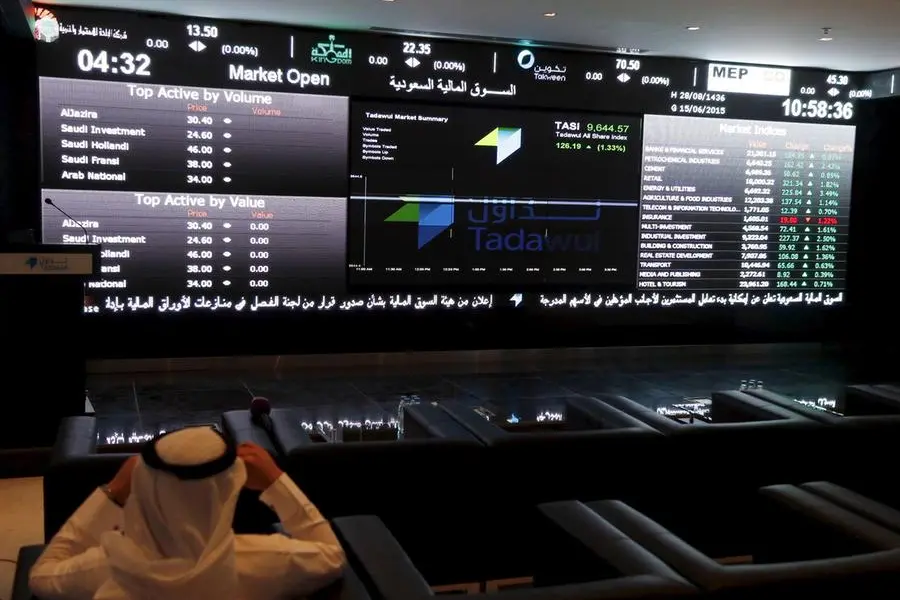PHOTO
Saudi Arabia’s stock market may witness a correction following global index compiler MSCI’s decision to incorporate the Kingdom into its global emerging markets index, according to an executive at a Dubai-based asset management firm.
Foreign institutional investors have already been buying into the Saudi market, with trading activity analysis during the first quarter of 2018 indicating that foreign institutional investors purchased approximately $2.1 billion worth of Saudi equities, according to Akber Naqvi, managing director and head of asset management at Al Masah Capital.
Saudi Arabia’s Tadawul All Share Index has been the best-performing Gulf stockmarket so far this year, posting gains of over 15 percent since the start of 2018 as investors anticipate a significant amount of fund inflows. Yet Naqvi said that there may be reversals in prices as investors seek to lock in gains.
“Taking UAE and Qatar as an example, Saudi may see a correction after the positive announcement,” he told Zawya by email.
In 2014, both the United Arab Emirates and Qatar were admitted into the MSCI Emerging Market Index. Saudi Arabia is the third country from the GCC to be included in the index. The organisation said that it will also consider reclassifying Kuwait in its 2019 market review, from Frontier to Emerging Market status.
The decision on Saudi stocks will lead to 32 Saudi companies being introduced onto MSCI’s Emerging Market Index in two phases next year, the organisation said when announcing its decision. The first step will take place in May 2019, when MSCI conducts a semi-annual index review, while the second will take place during a quarterly index review in August.
Naqvi said that as this takes place, Saudi market valuations may fluctuate, but in general the trend will remain upwards. He added that any positive developments on the Aramco IPO would also supplement these gains.
“From the announcement in 2012 to the actual inclusion in 2014, UAE and Qatar went up 231.38 percent and 59.65 percent respectively,” Naqvi said, adding that the annual gains for the same two-year period were 85.46 percent for the UAE and 39.41 percent for Qatar.
Saudi Basic Industries Corp, a diversified manufacturing company, together with Al Rahji Bank, are expected to see the biggest inflows following the MSCI upgrade as they comprise almost a quarter of the local stock gauge, he added.
Regional competition
Saudi Araba’s inclusion into MSCI Emerging Market Index will not only increase the number of passive fund inflows, but will also intensify competition with, and amongst, neighbouring countries, pushing them to develop their capital markets further, in the interest of upgrading their status to developed markets, according to Naqvi.
“Saudi Arabia has progressed swiftly compared to its fellow GCC countries UAE and Qatar, both of which took six years to implement necessary reforms to join the index,” he said.
But in the interest of avoiding fund outflows to neighbouring countries, the UAE is implementing drastic reforms in regards to attracting foreign investors, according to him.
The UAE recently announced that it would grant non-Emiratis full ownership of private businesses in Dubai and Abu Dhabi, even in the absence of a local partner. Additionally, selected professionals will be entitled to prolonged residency permits of up to ten years.
Meanwhile, in Qatar, plans to grant selected foreigners the right to reside indefinitely within its borders were discussed last August. Several blue-chip Qatar companies have also recently raised foreign ownership limits in their stocks. Qatar National Bank and Industries Qatar both raised foreign ownership limits to 49 percent in March – up from 25 percent previously. Qatar Petroleum's fuel distributor Woqod and Barwa Real Estate have subsequently followed suit.
Saudi’s inclusion into MSCI Emerging Market Index will potentially spur an approximated surge of $7 billion in the next 3-6 months, and Saudi shares should eventually constitute 2.7 percent of the MSCI Emerging Market index, according to Naqvi.
“This approximation is projected to practically double up to 4.6 percent with renowned company Saudi Aramco’s listing, alongside separate passive fund inflows amounting to a whopping $10 billion,” he said.
Credit ratings agency Moody’s said that the inclusion of Saudi stocks in the MSCI Emerging Markets Index will facilitate investors’ accessibility to the local stock market and will attract foreign investments into Saudi Arabia.
“International asset owners managing passive investment strategies in the emerging market space will see their investment universe broadened. $ 1.9 trillion in assets are currently benchmarked to the MSCI Emerging Markets Index suite,” Vanessa Robert, a vice-president and senior credit officer at Moody’s Investors Service said.
(Reporting by Nada Al Rifai; Editing by Michael Fahy)
(nada.rifai@thomsonreuters.com)
Our Standards: The Thomson Reuters Trust Principles
Disclaimer: This article is provided for informational purposes only. The content does not provide tax, legal or investment advice or opinion regarding the suitability, value or profitability of any particular security, portfolio or investment strategy. Read our full disclaimer policy here.
© ZAWYA 2018





















